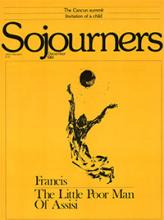By the spring of 1209, Francis had attracted a growing number of followers, and he realized that they should have some common rule or order of life. He wrote a short rule largely made up of biblical passages and went with his little community to Rome to seek the pope's approval, which after some delay Pope Innocent III gave him orally.
As the years passed, revisions became necessary to accommodate the growth and changes in the young community, the "Order of Friars Minor." In 1221 Francis set about revising the rule, which became the basis for a more legal and official document written in 1223. The Rule of 1221, however, remains Francis' original written expression of the way of life he would have his friars live.
Excerpts follow, taken from the English Omnibus of the Sources for the Life of St. Francis.
The Rule and the life of the friars is to live in obedience, in chastity and without property, following the teaching and the footsteps of our Lord Jesus Christ who says, "If thou wilt be perfect, go, sell what thou hast, and give to the poor, and thou shalt have treasure in heaven; and come, follow me" (Matthew 19:21); and, "If anyone wishes to come after me, let him deny himself, and take up his cross, and follow me" (Matthew 16:24).
The friars who have already made their profession of obedience may have one habit with a hood and, if necessary, another without a hood. They may also have a cord and trousers. All the friars must wear poor clothes and they can patch them with pieces of sackcloth and other material, with God's blessing. As our Lord tells us in the Gospel, "Those who wear fine clothes and live in luxury are in the houses of kings" (Luke 7:25).
The friars should behave towards one another the way the Lord tells us: "Therefore all that you wish men to do to you, even so do you also to them" (Matthew 7:12).
Read the Full Article

